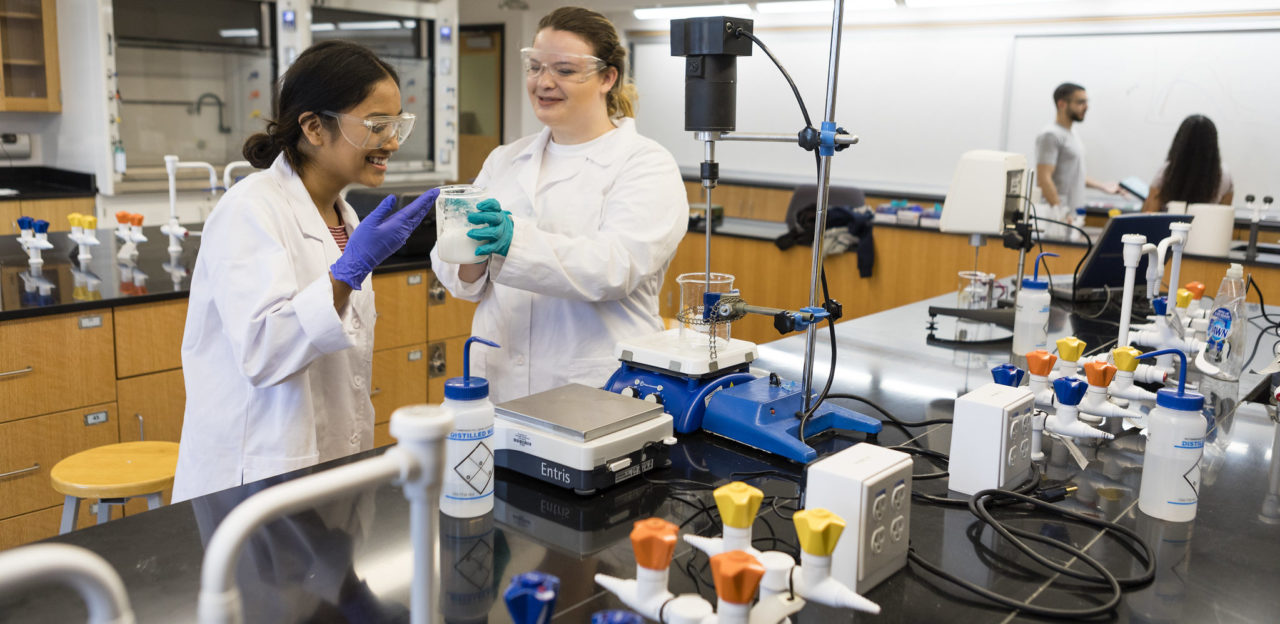Chemistry BS, Cosmetic Science MS: combined degree

The Department of Chemistry, Biochemistry and Physics offers a five-year program that allows qualified students to attain a Bachelor of Science degree in chemistry and a Master of Science degree in science with a cosmetic science concentration.
Degree Plan
NOTE: All students are required to complete the General Education Requirements of their campus in fulfillment of their Bachelor degree requirements.
Semesters 1 and 2
- CHEM1201 General Chemistry I Lecture
- CHEM1203 General Chemistry I Laboratory
- CHEM1202 General Chemistry II Lecture
- CHEM1204 General Chemistry II Laboratory
Semesters 3 and 4
- CHEM2261 Organic Chemistry I Lecture
- CHEM2263 Organic Chemistry I Laboratory
- CHEM2262 Organic Chemistry II Lecture
- CHEM2264 Organic Chemistry II Laboratory
Semesters 5
- CHEM3241 Physical Chemistry I Lecture
- CHEM3243 Physical Chemistry I Laboratory
- CHEM3281 Biochemistry I Lecture
- CHEM3389 Biochemistry I Laboratory
Semester 6
Semester 7
- CHEM2211 Inorganic Chemistry Lecture
- CHEM2221 Analytical Chemistry Lecture
- CHEM2223 Analytical Chemistry Laboratory
- Cosmetic Science Requirement
Semester 8
- CHEM2314 Inorganic Chemistry Laboratory
- CHEM4215 Advanced Inorganic Chemistry (or)
- CHEM6773 Polymer Chemistry
- CHEM4233 Instrumental Analysis Lecture
- CHEM4234 Instrumental Analysis Laboratory
- CHEM4401 Chemistry Seminar
- Cosmetic Science Requirement
- Cosmetic Science Elective
9th Semester
- Cosmetic Science Requirement (6 credits)
- Cosmetic Science Elective (3 credits)
- Graduate Elective (3 credits)
10th semester
- Cosmetic Science Requirement (6 credits)
- COSC6548 Cosmetic Science Lab
- Graduate Elective (3 credits)
Cognate Requirements
Semesters 1 and 2
Semesters 3 and 4
- PHYS2203 / PHYS2201 University Physics I Lecture / Laboratory
- PHYS2204 / PHYS2202 University Physics II Lecture / Laboratory
Major Requirements:
Major Electives: Take 1-8 credits of CHEM or BIOL. Please see an advisor for a list of courses
Advance Mathematics Course: select one course, three credits, from the following:
- MATH2203 Calculus III
- MATH2337 Applied Statistics
Free Electives: May be chosen from any courses offered at the University after consultation with an advisor.
Graduate Courses for BS and MS degree: Students should consult with their advisors for course selections and new course offerings.
Required Courses: Twenty additional credits from the following
- COSC6547 Skin Care Raw Materials & Formulations
- COSC6543 Hair Care Raw Materials & Formulations
- COSC6548 Cosmetic Science Laboratory
- PHYS6753 Applied Colloid & Surface Science
- CHEM6526 Product Development
- CHEM6529 Microtoxicity and Biochemistry
- COSC6756 Dermal Pharmacology & Immunology
Cosmetic Science Electives (6 credits)
- CHEM6546 Perfumery
- BIOL6728 Bioethics
- COSC6549 Color Cosmetics
- COSC6542 Claims Substantiation
- CHEM6781 Biochemistry
- CHEM6773 Polymer Chemistry
Graduate Electives (6 credits):
- Includes graduate courses in Chemistry, Biology, Marketing, Pharmaceutical Chemistry, Management, Communication, or Cosmetic Science.
A minimum of 120 credits is required for the BS degree, and a minimum of an additional 23 credits for the MS degree, for a total of 143 credits for the combined degree.